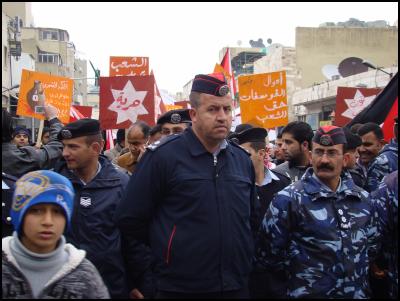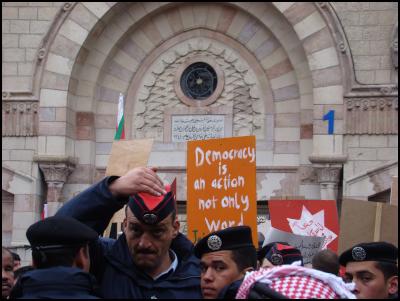Jordan: Another perspective – or two
Jordan: Another perspective – or two
The last week in Jordan has been marked with protests in several locations. From Tuesday’s protest outside Parliament calling for the dissolution of the Lower House, to Friday’s rally in Zarka, the weekly Al Husseini protest, and the “National Conference for Reform” festival held at the Professional Association in Amman, Jordanians are increasing their calls for economic and political reforms. Some background is necessary.
Jordan’s Electoral
Environment
Over 60% of Jordan’s population is
of Palestinian origin, and the issue of Palestinians and
electoral reform is a sensitive one, given that Jordan is
the only country in the region to have given citizenship to
a sizeable number of Palestinian refugees, most of who live
in urban areas. Under the ‘Temporary’ Electoral Law
passed in 2010 by former Prime Minister Rifai’s Cabinet
(which is little different from the ‘temporary’
Electoral Law of 2001), an urban constituency gets only one
seat, as does a constituency in the countryside with far
less voters, leaving urban voters (ie those of Palestinian
origin) greatly under-represented. The ‘temporary’
law’s failure to include reforms recommended by the
National Agenda Committee of 2005 is thus considered by many
to be a deliberate limiting of the political influence of
urban Jordanian/Palestinians, by favouring voters in the
countryside, from whence the King’s main support is
derived. In addition to inequality of representation,
electoral law criticisms include the lack of transparency,
lack of secrecy, and lack of effective remedies for
disgruntled voters.

Click for big version
Powers of the
King
In Jordan, legislation must be passed by
both houses of parliament. There are two houses, the
Chamber of Deputies (the Lower House), and the Senate. The
Chamber of Deputies is elected as per above, but the King
may dissolve it. The King appoints the Senate, as well as
the Ministers, and can also dissolve the Senate and dismiss
the Ministers. The King appoints the Prime Minister, and can
also dismiss him. He is also the Supreme Commander of the
Land, Naval, and Air forces, and ratifier of treaties and
agreements with other countries.(1)
Jordanians’
Demands
Common to all protests is the demand for
electoral reform, unsurprising given the problems with the
‘temporary’ Electoral Law, which many national and
international NGOs have pointed out does not meet Jordan’s
obligations under the United Nations Convention on Civil and
Political Rights.

Click for big version
For example, Tuesday’s protest at Parliament, organised by Boycotters for Change, a group formed before last November’s elections, complained that the temporary Elections Law undermines the principles of civil society and favours tribalism at the expense of political candidates.
They also expressed outrage at recent comments of Member of Parliament Mohammad Kouz, who called people participating in the weekly protests “outlaws” and suggested they “go to the King Hussein Bridge.” The King Hussein Bridge links Jordan with Palestine, and his comments were widely interpreted as a reference to Jordanians of Palestinian origin.
On Friday and Saturday, other protesters called for dissolving Parliament, establishing a constitutional court, fighting corruption and amending the Constitution and other pieces of legislation.
I interviewed two protesters outside Al Husseini Mosque on Friday, one a member of umbrella organisation Jaien, a youth movement, and the other a Professor of Economics, writer, and activist. This article will focus on Jaien, and its issues of concern.
Interview with Adham Gharaibeh of
Jaien
“Jaien is an umbrella for
hundreds of young people calling for constitutional reform
and special courts for corruption, the major two things we
are concerned about in Jordan. We feel that some people in
power are acting like thieves, they are stealing our
companies, our national resources, everything, and we never
know where the money, how they are using the money, for what
– it is very very abusive, they are using the money for
their special purposes. So we are organising weekly
demonstrations calling for the Constitution of 1952, and a
special court for corruption, these are the two major
things,” Adham told me.
Is part of that to lessen the power of the King? I asked.
“I think it’s totally the power of the King, I don’t feel afraid to say that, we are not against the King himself, we are supporting him and we are asking him to take action against these people. We are wondering why there is no action against those people who are playing with the elections, or selling the national resources of the Jordanian people. So we hope the King will take action against those people.”
How much confidence do you have that he will act?
“No comment,” he laughs.
Are women very involved in the movement for change here? I ask.
“You are speaking about the Queen Rania, I know that! In fact you have to say it secretly and I have to say it secretly, you know, but anyway, I think Queen Rania, she is only the wife of the King and in the Constitution she has nothing to play, to be honest with you. However, many people believe that she is interfering with the politics which is against the constitution and this makes big problems in the country. Personally I respect her, and I hope she will take care about this issue, she has to know that she is only the wife of the King.”
In fact I wasn’t speaking about Queen Rania, I just wanted to know about the level of women’s involvement in the protest movement! I was surprised to hear his sentiments, reflecting as they did a petition recently presented to King Abdullah urging him to end his wife’s role in politics. (2) But not to let an opportunity pass, I then asked whether the Palestinian issue is at the forefront of current dissatisfaction.
Adham replied, “Many Jordanian people do not believe in the peace [treaty] between Jordan and Israel because Israel itself is not respecting its signature, and they are killing Palestinian people in their own country, and they are very very enemy towards Arabs, and they are occupying their territories. We believe here in Jordan that the Wadi Araba agreement between the Jordanian government and Israel should not be anymore, because it was unfair to the Jordanian people, that’s why. However it’s not an issue of religions, I mean I don’t feel that they are my enemy as Jewish people, however from an ethical and political point of view yes, they are acting very badly.”
The Israeli Government has recently launched a petition to the Jordanian King demanding he declare Jordan a Palestinian State (3), which has aroused outrage amongst both Jordanians and Palestinians, but for different reasons. Jordanians consider it a gross assault on their sovereignty, while for Palestinians it represents an attack on their “Right of Return” entitlement under international law. This cynical move by Israel has the potential to create internal divisions within Jordanian society. I asked Adham, “Within Jordan itself, is there any friction between Palestinians and Jordanians?”
“I don’t think so, not really. In fact most of the people who are demonstrating right now are originally Jordanian, from East Jordan, and I hope that the Jordanian Palestinians will be more involved with the national issues. I encourage them to share this with us, we want to see them in all spaces, because most of the demonstrations are in the, let me use this term, the ‘pure Jordanian cities’. I encourage them to be more involved with the national issues,” he replied.
Perhaps they will be reluctant to do so while the very real impediments to their participation in Jordan’s political life, evidenced in the examples above and in the previous article, remain.
(1) The Constitution of The Hashemite Kingdom of Jordan http://www.kinghussein.gov.jo/constitution_jo.html
(2) Jordan tribes criticize queen's role in politics http://www.alarabiya.net/articles/2011/02/08/136846.html
(3) http://www.ipetition.com/str-asp-PetitionID_9-end-SignPetition.htm


 Binoy Kampmark: Trump, AUKUS And Australia’s Dim Servitors
Binoy Kampmark: Trump, AUKUS And Australia’s Dim Servitors Peter Dunne: Dunne's Weekly - The Wrong Answer To A Question That Does Not Exist
Peter Dunne: Dunne's Weekly - The Wrong Answer To A Question That Does Not Exist Martin LeFevre - Meditations: Perception, Conception And Beauty
Martin LeFevre - Meditations: Perception, Conception And Beauty Alastair Thompson: On The Publication Of The First NCQG Text 'New Collective Quantified Goal On Climate Finance'
Alastair Thompson: On The Publication Of The First NCQG Text 'New Collective Quantified Goal On Climate Finance' Ramzy Baroud: A Nation In Denial - Why Israel’s Defeat Is Imminent
Ramzy Baroud: A Nation In Denial - Why Israel’s Defeat Is Imminent Richard S. Ehrlich: Trump's Victory, Authoritarians & Trade Warriors
Richard S. Ehrlich: Trump's Victory, Authoritarians & Trade Warriors